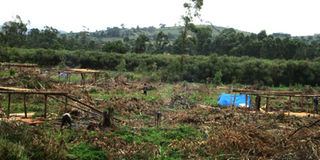Bunyangabu struggles to deliver services as government grants delay

Demand. Kibiito Health Centre III in the Bunyangabu District. Authorities want the government to elevate the centre to a hospital status to serve the people better. PHOTO BY FELIX BASIIME.
What you need to know:
- Stranded. The district leadership says ever since its inception on July 1, they have never received any money from the central government to implement the plans and that this has affected its operations and progress.
BUNYANGABU: The newly created Bunyangabu District is struggling to deliver services as government has not deposited any money on its accounts to run its operations since its inception on July 1.
Bunyangabu District was carved out of Kabarole District after it was approved by Parliament in 2015 to start operating in the Financial Year 2017/2018.
It is now almost two months since the district became operational but the struggle to implement district planned activities has remained a challenge due to lack of resources.
During the 2017/18 budget review for Kabarole District in May, the then secretary for finance, planning and administration, Mr Peter Musiguzi, presented a budget of Shs13b for Bunyangabu District with Shs361m from local revenue and the rest was to be provided for by the central government.
But due to lack of funds, the new district is currently sharing the administration block with Kibito Town Council, which members of staff say is congested and hence makes their work difficult.
The interim chairman for Bunyangabu District, Mr Musiguzi, says from day one, the heads of departments have been using their own personal resources to run the activities of the district.
Musiguzi revealed that Kabarole District has also been helping them with both stationery and fuel to use as they wait for operational funds from government.
“As I talk now, the district has not received any money from government to run district activities and we have been helped by Kabarole District to carry out some activities,” Musiguzi said.
Equally, the acting vice chairperson, Mr Remegiaus Turyahebwa, revealed that all civil servants in the district have not received their salaries.
Mr Turyahebwa explains that they have made work plans in all seven sub-counties and five town councils but they are only waiting for funds from government to start working on roads and bridges in villages and other priority areas.
“We are going to receive the road unit from government but we don’t have drivers and as a new district, we have few workers who are in acting positions which is hindering service delivery to the community,” Turyahebwa says.
He says the interim council has budgeted Shs700m to construct district administration block, Shs130m for vehicles and also to renovate Kibito Town Council structure where they are operating from.
Ms Annent Kasamba, the woman councillor representing Kabonero and Kibito town councils, says since July 1, all district councillors have not received their allowances and salaries but use their own money to monitor government programmes.
“When we sit in council, we are supposed to receive our allowances that very day but unfortunately, it is now the second time we have sat without pay and even our July dues of Shs175,000 are not yet paid,” Kasamba says.
The acting chief administrative officer, Mr Peter Ruhweeza Nsungwa, attributes the delay of salaries of civil servants and councillors to the delay in having them onto the Finance ministry accounts; a move he said takes long.
“I cannot tell you when councillors, civil servants and other grants from central government will be on our account and we start working for people. There is no body who is striking over that,” Mr Ruhweeza said.
Issues in the new districts
Under the Constitution, new districts can be created on the basis of the necessity for effective administration and the need to bring services closer to people but with time this has almost lost meaning.
Other considerations that are usually taken into account in the creation of new districts include the means of communication, geographical features, and the density of the population, economic viability, and the wishes of the people concerned.
However, some observers say the NRM government is in the habit of creating districts both as a reward for its supporters and as a condition for support in areas where it has historically not enjoyed popular support.
The observers further explain that this politicisation of the decentralisation process has greatly undermined performance.
Uganda has moved from 38 districts in 1986 when NRM government captured power, to more than 112 districts now.


